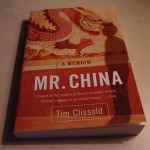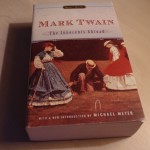And now we’re back into the semester as the National Day break has ended. The wind has picked up, bringing colder weather and knocking the leaves from the trees, which have hardly had time to change colour. The one good thing about the wind is that it blows the smog away from the city.
Since I stayed put during my break I had some time to do some reading. Below you’ll find a couple of the books I completed lately, Tim Clissold’s Mr. China and Mark Twain’s The Innocents Abroad.
Mr. China
 Finished reading Mr. China by Tim Clissold. An easy read despite a few more spelling errors than I would think possible for a professionally published book. The book retells the story of how Mr. Clissold and his New York partner, Pat, raised a bunch of money in order to invest in China by way of joint ventures. For those of you unfamiliar with joint ventures, it’s a company in which there are two owners but each partner isn’t liable for the other’s liabilities. Or at least that’s how it’s supposed to be. Well the Chinese companies in this story, burdened with debt, simply took the money to pay off their debts and then, if they didn’t altogether disappear, they bungled up the partnership with all sorts of stalling tactics. That is to say, they took the money and kept the company.
Finished reading Mr. China by Tim Clissold. An easy read despite a few more spelling errors than I would think possible for a professionally published book. The book retells the story of how Mr. Clissold and his New York partner, Pat, raised a bunch of money in order to invest in China by way of joint ventures. For those of you unfamiliar with joint ventures, it’s a company in which there are two owners but each partner isn’t liable for the other’s liabilities. Or at least that’s how it’s supposed to be. Well the Chinese companies in this story, burdened with debt, simply took the money to pay off their debts and then, if they didn’t altogether disappear, they bungled up the partnership with all sorts of stalling tactics. That is to say, they took the money and kept the company.
Throughout the book you read instance after instance of this USAmerican fund giving money to Chinese companies and trying to run it like a company in the US. All the Americans know how to do is go through legal channels when it’s clear that the Chinese companies simply don’t care for the American style of legal paperwork. All the Chinese companies knew was that money went into their bank and that there was some white guy trying to say that some strangers in the USA now owned the company. It got frustrating reading about it after a while, why didn’t Clissold smarten up?
By the end of the book, which ends roughly just before the new millennium, Clissold informs us that joint ventures were no longer in vogue in China and instead companies would simply set up their own bases in China. When Clissold entered China there weren’t many, if any, ways for foreign investors to buy into China. Clissold’s story is basically the story of China’s opening up to US investment in the 1990s.
Anyway, it’s an interesting read and gives you a sense of what China was like before their massive industrialization in the 1990s. He tells how Shanghai was a dump; that much of central and western China were “backwards” in the eyes of Westerners; and that doing business in China in those days required knowledge of guanxi, connections to the right people. It’s interesting to see (now) in the newspapers that many former businessmen and politicians are being imprisoned for graft, which is basically what was happening to Clissold’s fund.
The Innocents Abroad
 The other book I finished over the break was Mark Twain’s Innocents Abroad. It’s probably the first Twain book I’ve read since we were forced to read The Adventures of Huckleberry Finn and the one about Tom Sawyer in high school. Innocents was released before the Tom and Huck stories and, unlike in high school, I can see now and appreciate Twain’s humour a little bit more, most likely due to the lack of pressure to actually read and try to understand Twain’s sometimes high-sounding prose and wry sense of humour. The book was originally a series of newspaper articles Twain wrote since he had been the beneficiary of a $1250 fee from some Californian newspaper. So off he went to travel the world.
The other book I finished over the break was Mark Twain’s Innocents Abroad. It’s probably the first Twain book I’ve read since we were forced to read The Adventures of Huckleberry Finn and the one about Tom Sawyer in high school. Innocents was released before the Tom and Huck stories and, unlike in high school, I can see now and appreciate Twain’s humour a little bit more, most likely due to the lack of pressure to actually read and try to understand Twain’s sometimes high-sounding prose and wry sense of humour. The book was originally a series of newspaper articles Twain wrote since he had been the beneficiary of a $1250 fee from some Californian newspaper. So off he went to travel the world.
In Innocents Abroad he tells the story of a “pleasure cruise” aboard the ship Quaker City which plays host to about 65 USAmericans mostly from the upper echelons of the social stratus on their five-month journey from New York to the Holy Land (Jerusalem). He recollects how he and many of the passengers reacted to being on a boat, crossing the ocean, and then travelling through Europe all the way to Jerusalem. He recollects how many of the passengers began the journey and faithfully kept journals until about the second month or so, by which point many had either fallen behind or simply given up writing altogether. Further, if the “pilgrims” couldn’t pronounce their guide’s names or if they thought it didn’t sound proper enough, they simply referred to the guide as “Ferguson”.
But those episodes weren’t what impressed me the most. What impressed me the most was Twain’s simple honesty that travelling sometimes sucks (such as when the donkeys won’t budge), is a rip off (when everybody asks for a bribe), or that the stories from other authors who make every place sound so wonderful may actually be completely full of shit. If it isn’t a description of some lake that doesn’t measure up to Twain’s expectations, then it’s the tour of the Holy Land that makes him think that nothing has changed since the time of Jesus.
It’s a book that has made me appreciate that you don’t actually have to like everything you do or see on your journeys. Twain’s background is a little bit different from mine since he never travelled much outside of the USA before he took the trip he describes in Innocents but his reactions are something I can relate to. The writing can be dense at times but no less entertaining.
Anyway, I’m glad I finished it now because if I hadn’t it might become one of those “lingering books”. You know the ones, the books you start only to put it on the bookshelf with a little bookmark in it to keep your place and then forget about it for months and when you do finally pick it up again, you’ve forgotten much of what the book was a about. Is there no greater joy than removing the bookmark and setting that book upon the shelf with the satisfaction that you have actually, indeed, read the book?